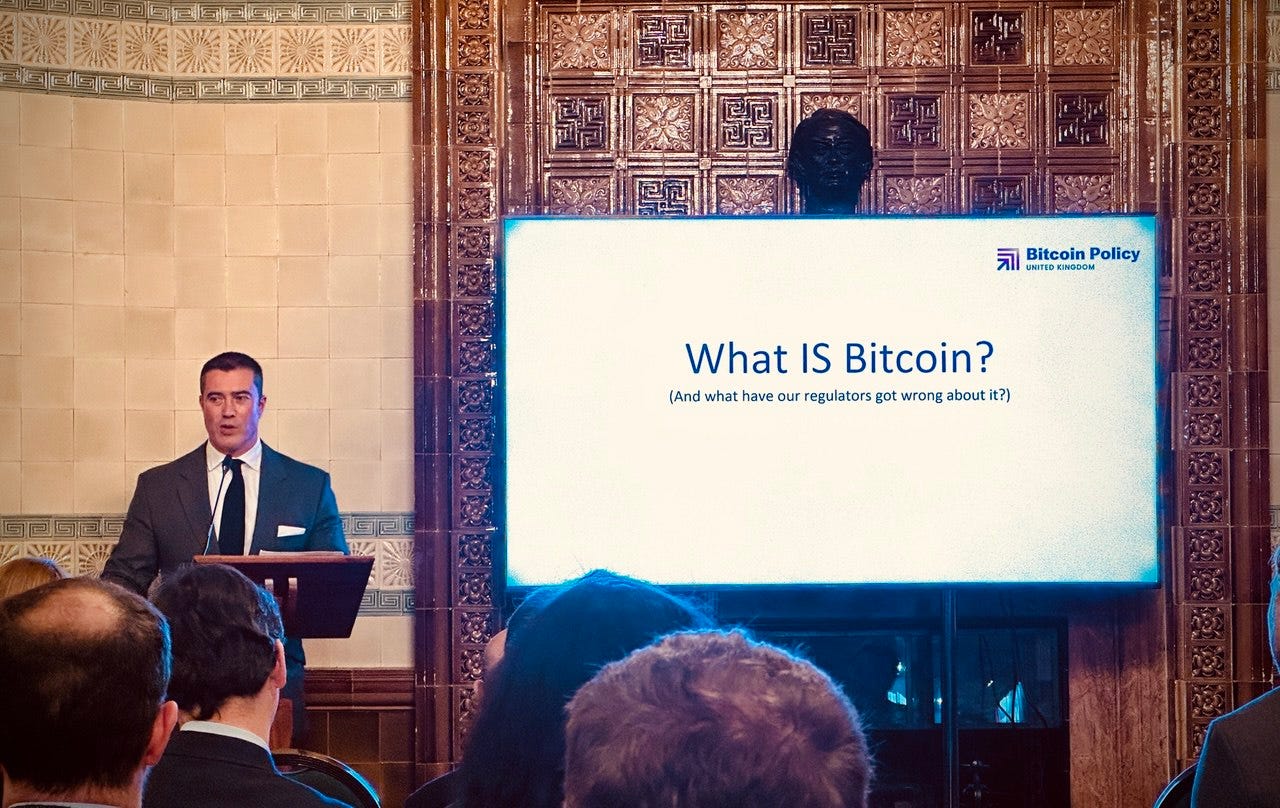The UK stands at a crossroads in the evolution of its financial services industry. Despite being a global hub for financial services, the country risks losing its edge by failing to embrace bitcoin. This message was the key takeaway at the Permissionless event, where founders, investors, and industry leaders gathered to discuss the opportunities and challenges facing bitcoin businesses in the UK.
Bitcoin Opportunity
Allen Farrington, co-founder of Axiom and a speaker at the event, was unequivocal in his assessment:
"The UK needs to embrace bitcoin. The longer it takes to do, the more we will miss out."
Farrington spoke of the reality of a nation overly reliant on financial services while struggling to compete in producing physical goods. He presented data from the Financial Times on average energy prices and said:
"It’s impossible to produce physical goods, so we make it up with financial services."
For Farrington, the failure to distinguish between bitcoin and broader crypto is holding the UK back.
"Perception and reality are two different things. Bitcoin is huge, and crypto is just fiat. We should be focusing entirely on bitcoin, not crypto," he stated.
This distinction is crucial, since bitcoin represents a decentralized financial system, whereas crypto is just a replica of the poor fiat system we currently use.
The Freedom to Innovate
Adrian Cannon, Chairman of Musqet, spoke passionately about the role of freedom in promoting innovation.
"We need freedom to be able to innovate," he argued, adding that regulation often stifles this freedom by locking businesses into outdated frameworks. Cannon cited the dominance of Visa and Mastercard as examples of entrenched systems that make scaling new payment solutions nearly impossible for challengers.
"How do you achieve scale in the presence of Visa and Mastercard?" he questioned.
Cannon painted a vivid picture of the hurdles facing innovators, from retraining staff to overcoming technological hype, ultimately asserting:
"It doesn’t matter how clever bitcoin is; the merchants will determine its success."
Broken Regulation
For some companies, the UK’s regulatory environment is simply untenable. Ben Cousens, Chief Strategy Officer at ZBD, a payment processor for interactive gaming, minced no words:
"We do not operate in the UK. FCA regulation is so absurd."
ZBD has thrived elsewhere, leveraging the bitcoin lightning network to integrate instant, low-cost transactions into video games. The company’s innovative model shares ad revenue with players, enhancing engagement and creating a new monetization paradigm. The UK’s Financial Conduct Authority (FCA) has created barriers that make operating in the region impossible, and the cost of compliance too high for new market entrants to bear, given the comparatively small size of the UK market.
Cousens highlighted that the EU’s MiCA regulations have allowed ZBD to flourish in Europe, illustrating how progressive frameworks can unlock potential.
A Missed Opportunity
Freddie New, co-founder of Bitcoin Policy UK, delivered a scathing critique of the FCA’s approach to bitcoin. He began with a warning:
"All fiat currencies eventually trend to zero."
New explained that bitcoin’s immutable monetary policy and decentralized nature make it a resilient alternative to fiat currencies in a world increasingly burdened by debt. The FCA’s refusal to engage meaningfully with industry experts has created a hostile environment for bitcoin businesses.
"Among the developed economies, we are the most hostile," he said, voicing frustration that the UK’s regulatory stance is driving businesses to friendlier jurisdictions.
New wrote to the FCA to highlight the flaws in its approach. Despite consulting experts who agreed with his concerns, the regulator pressed ahead with policies that have made the UK uncompetitive.
"If they weren’t going to listen to experts, what was the point of the consultation?"
The Hard Truth
The Permissionless event drew attention to a harsh reality: the UK is falling behind. While other regions innovate and attract investment, the UK is mired in regulatory inertia. The FCA’s approach is not just a roadblock—it signals the world that the UK is not open for bitcoin business - and potentially tarnishes the UK’s wider reputation as a place for innovative financial services in the round.
If the UK hopes to maintain its leadership in financial services, it must act decisively. The choice is clear: embrace bitcoin and unlock its potential, or remain shackled by outdated frameworks that stifle growth.
As Farrington aptly said, "The biggest threat for the UK is not embracing bitcoin."
The clock is ticking.
The UK cannot afford to wait.








What approaches can we take to influence decision making and help sway opinion towards Bitcoin? Write to our MPs? Could a campaign from yourselves to do just that help?
Nigel Farage is a bitcoiner. The Reform Party could do well to endorse Bitcoin as a wedge issue for the forthcoming local elections.